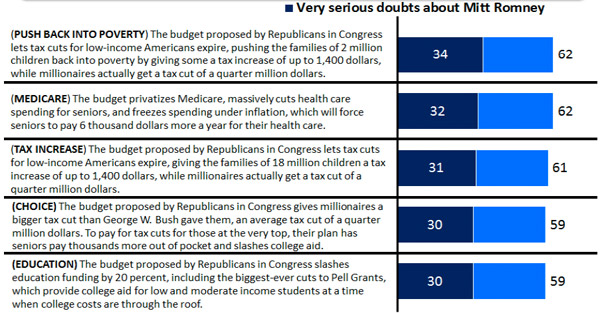Steve Bogira, who's long chronicled poverty and segregation in Chicago for the Reader (and in his book Courtroom 302), has written several times about how poverty has more or less vanished from the political scene as a critical issue. What was once foundational for politicians like Lyndon Johnson and John F. Kennedy was reduced to a plank for Bill Clinton (who signed the bill that turned ADFC into TANF) and George W. Bush, and was basically absent for both John McCain and Barack Obama. This year the economic struggles of the poor have been ceded to those of the middle class in the realm of campaign rhetoric:
n his new book, So Rich, So Poor, Georgetown law professor Peter Edelman notes that the president's stimulus legislation in 2009 aided the poor and near-poor significantly. "Yet even as he took positive action, President Obama made little use of the word 'poverty,'" writes Edelman, who was a top adviser to Senator Robert F. Kennedy in the 1960s and has worked to combat poverty in various roles ever since.
Romney’s misstep, introducing his new running mate as “the next President of the United States,” wasn’t surprising – he’s always been comically gaffe prone. But something else was. Both his and Paul Ryan’s speech on Sunday talked about poverty. Not poverty of sentiment or ideas, though that’s certainly present in both campaigns, but explicit mention that a sixth of Americans live in material poverty.
As with the selection of Paul Ryan, it's a curious choice. According to CNN's most recent poll, Romney does well with those in and above the middle-class brackets, and tanks with the lower-middle-class and poor: over $50k/year, Romney's favorable/unfavorable splits are 52/43, under that they're 40/55. They're reaching out to a demographic that's not inclined to support them. And it's risky, given that Romney's support of the Ryan budget is now emphasized by his pick of Ryan as his running mate.
James Carville and Stan Greenberg employed Greenberg's polling firm (the one that did Rahm Emanuel's mayoral polling; Greenberg and his wife are former landords to the current mayor) to test the Ryan budget, and possible lines of attack against it, on voters. It's an unquestionably Democratic firm, but they also don't have any incentives to give stupid advice to the Obama campaign and organizations that support it. And they suggest that Obama could run in 2012 on poverty as well, specifically against the Ryan budget. When they asked respondents leading questions—which is what political advertising and rhetoric does—about various things that make Mitt Romney bad, here's what they found:

Seniors polled were actually more concerned about the poverty criticism than Medicare.
Then the pollsters switched it up a bit, adding the phrase "what it [the Ryan budget] would do to the most vulnerable." That moved the numbers in Obama's favor quite a bit.
Do I think the Obama campaign will actually run on poverty as a campaign issue? No. Steve Benen and Nate Cohn make a compelling argument that this election will be about seniors, Medicare, and Democrats' desire to erase Republican gains among retirees: "if the Obama campaign successfully defines the Ryan plan as anti-Medicare, Romney could be in big trouble. Romney is utterly dependent on older voters and, while seniors have always been a weakness for Obama, the fact that 48 percent voted for Kerry in 2004 suggests that there are persuadable seniors or even latent Democrats who might be open to voting for Obama." If the Obama campaign can hurt Romney with seniors, it's over.
In other words, replace "robots" with "Mitt Romney and Paul Ryan":



